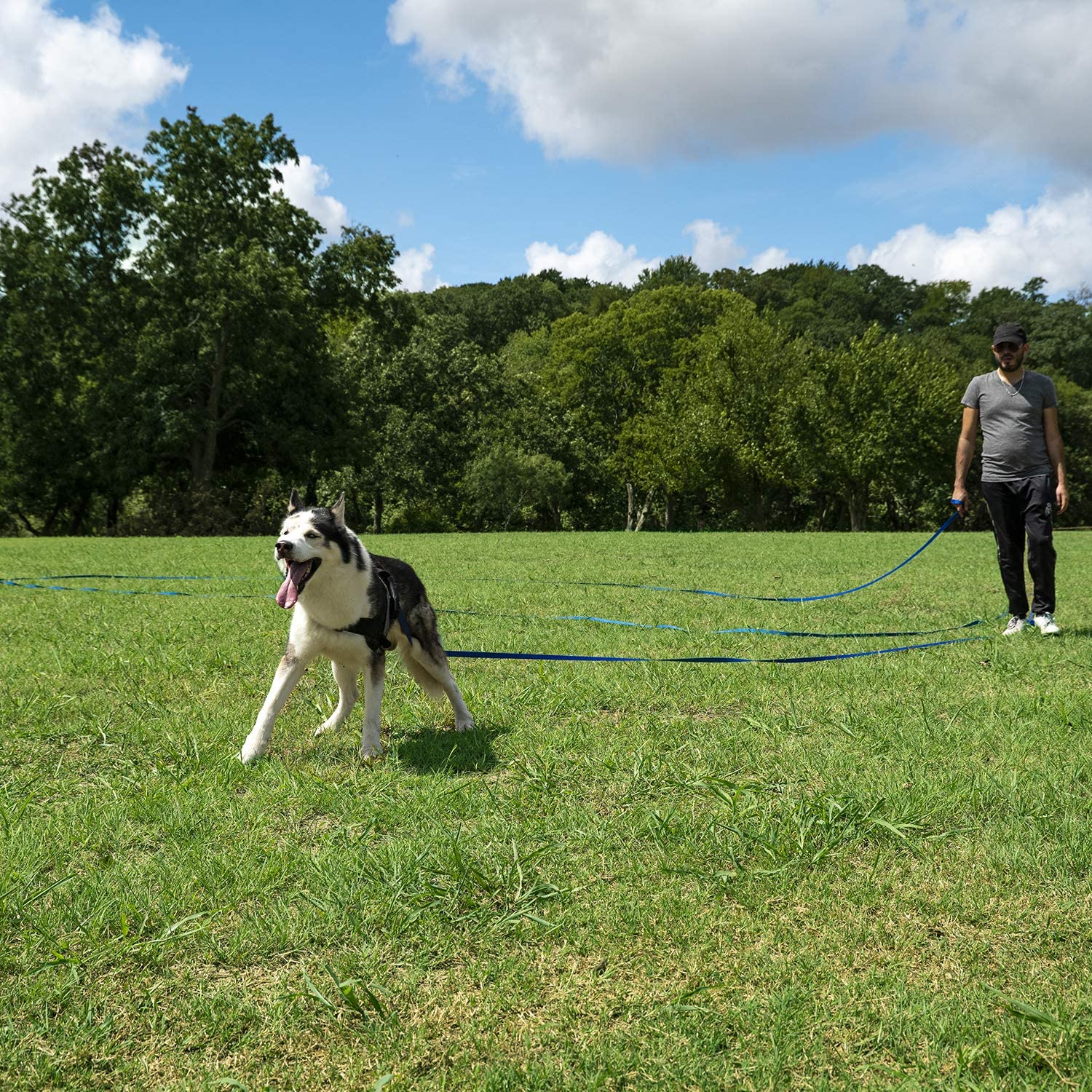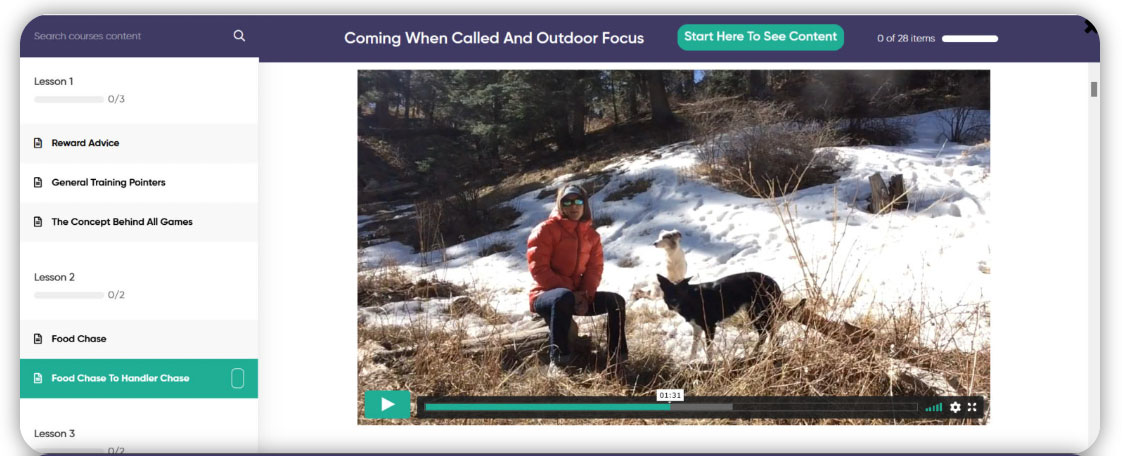

Training your collie to come when called is an essential skill that every dog owner should prioritize. Not only does it ensure your pet’s safety, but it also helps strengthen your bond with them. Collies are intelligent and responsive dogs, making them great candidates for training. However, teaching them to come when called requires patience, consistency, and positive reinforcement.
In this article, we will explore effective strategies for training your collie to come when called and provide tips on how to troubleshoot common challenges that may arise during the process. By following these steps, you can improve your collie’s recall and enjoy a more harmonious relationship with your furry friend.
Note: For a complete training, we highly recommend this SpiritDog Online Training Course “Coming When Called”.
1. Start with a Strong Foundation
Before you begin training your collie to come when called, it’s crucial to establish a strong bond with your pet. Spend time playing with your dog, engaging in activities they enjoy, and providing positive reinforcement through praise and treats. Building trust and a strong connection with your collie will make them more likely to respond positively to your commands.
2. Choose a Distinct Command Word
Select a specific word or phrase for the recall command, such as “come” or “here.” Ensure that the command is distinct from other commands you use and that all family members use the same word consistently. Consistency is critical to avoid confusing your collie and ensuring that they understand what you expect from them.
3. Begin Training Your Collie in a Controlled Environment
Start training your collie to come when called in a controlled, distraction-free environment like your home or a fenced yard. In the early stages of training, it’s essential to minimize distractions to help your dog focus on learning the new command. As your dog becomes more reliable in responding to the recall command, gradually introduce distractions and practice in various environments.
4. Use Positive Reinforcement with Your Collie
When training your collie to come when called, always use positive reinforcement techniques. Reward your pup with praise, treats, or playtime when they respond to your recall command. This will help create a positive association with the command and motivate your dog to respond consistently. Remember to be patient and consistent in your training, as it may take time for your dog to master the recall command.
If you’re using treats, these are currently the most popular training treats on Amazon.
5. Gradually Increase Distance and Distractions
As your collie becomes more reliable in responding to the recall command in a controlled environment, begin to increase the distance between you and your dog during training sessions. Practice calling your dog from various distances and gradually introduce distractions, such as other dogs, people, or toys. This will help your dog learn to respond to the command even in challenging situations.
Related: Looking for the fastest way to train your collie to come when called? Try this video course.
6. Make Yourself Interesting and Rewarding to Your Collie
To encourage your collie to come when called, make yourself more appealing and rewarding to your dog. Use an enthusiastic, high-pitched voice when calling your dog, and reward them with a treat or praise when they respond. You can also try running away from your dog when calling them, as this can entice your dog to chase after you and respond to the recall command.
7. Never Punish Your Collie for Coming When Called
It’s essential to avoid punishing your collie if they do not immediately respond to the recall command or if they come to you slowly. Punishing your dog can create a negative association with the command and make them less likely to respond in the future. Instead, be patient and continue to practice and reinforce the command using positive reinforcement techniques.
8. Practice the Recall Command Regularly with Your Collie
Consistent practice is crucial for training your collie to come when called. Incorporate recall training into your dog’s daily routine, and practice the command in various environments and situations. This will help reinforce the behavior and make it more reliable over time.
9. Use a Long Training Leash on Your Collie
When transitioning from a controlled environment to a more open space, consider using a long training leash to maintain control over your collie while they learn to respond to the recall command. This will help you avoid losing control of your dog and provide a safety measure as you gradually increase the distance and distractions during training sessions.
This is the most popular long training leash on Amazon.
10. Be Patient and Persistent with Your Collie
Training your collie to come when called takes time, patience, and persistence. Some dogs may learn the command quickly, while others may require more time and consistent practice. Be patient with your dog and maintain a positive attitude during training sessions. Remember that every dog is unique, and the key to success is consistent practice and positive reinforcement.
11. Use a Professional Online Collie Training Course
While this article provides many helpful tips for training your collie, you can increase your chances of success by enlisting the help of a professional online dog trainer. We love the SpiritDog online courses, since its includes unlimited questions with a real dog trainer.
You can check out their Teach Your Collie to Come Online Course Here
In conclusion, teaching your collie to come when called is a crucial aspect of dog training that requires patience, consistency, and positive reinforcement. By using rewards, establishing a routine, and practicing in different settings, you can improve your collie’s recall and ensure their safety. Remember to always be patient and understanding, as training takes time and effort. With persistence and dedication, you can help your collie become a well-behaved and obedient companion. So, start training today and enjoy the benefits of a strong bond and a reliable recall with your furry friend!
More Frequently Asked Questions For Training Your Collie
1. How do I train my collie to stop barking excessively?
Collies are known for being vocal dogs, and excessive barking can become a problem if left unaddressed. To train your collie to stop barking excessively, you will need to identify the triggers that cause them to bark and then use positive reinforcement to teach them alternative behaviors.
First, make sure that your collie is getting enough exercise and mental stimulation throughout the day. A tired dog is less likely to bark excessively. Next, identify the triggers that cause your collie to bark, such as visitors at the door, other dogs, or loud noises. Once you have identified the triggers, you can work on teaching your collie alternative behaviors.
For example, when the doorbell rings, ask your collie to go to their bed or crate and reward them for doing so. Over time, your collie will learn that going to their bed or crate is a positive and rewarding behavior, and they will be less likely to bark excessively when the doorbell rings.
It’s important to remember that training takes time and patience. You may need to work with a professional dog trainer to address excessive barking in your collie.
2. How do I train my collie to walk on a leash without pulling?
Collies are energetic dogs that love to explore, which can make leash walking a challenge. However, with consistent training and positive reinforcement, you can teach your collie to walk on a leash without pulling.
Start by teaching your collie to walk on a loose leash. Whenever your collie pulls on the leash, stop walking and wait for them to come back to you. When your collie returns to your side, reward them with a treat or praise.
You can also try using a training tool, such as a front-clip harness or a head halter, to discourage pulling. These tools work by redirecting your collie’s attention back to you when they start to pull on the leash.
Consistency is key when it comes to leash training. Make sure that everyone who walks your collie is using the same training techniques and tools. With patience and persistence, your collie will learn to walk on a leash without pulling.
3. How do I train my collie to be well-behaved around other dogs?
Collies are social dogs that enjoy being around people and other dogs. However, if not properly socialized, they can become anxious or reactive around other dogs. To train your collie to be well-behaved around other dogs, you will need to socialize them from a young age and use positive reinforcement to teach them appropriate behavior.
Start by introducing your collie to other dogs in a controlled environment, such as a dog park or a friend’s backyard. Keep the initial interactions short and positive, and reward your collie for calm and appropriate behavior.
As your collie becomes more comfortable around other dogs, gradually increase the length and complexity of the interactions. Always supervise your collie’s interactions with other dogs and intervene if necessary.
If your collie shows signs of anxiety or reactivity around other dogs, such as growling or barking, it’s important to address the behavior immediately. Work with a professional dog trainer to develop a behavior modification plan that uses positive reinforcement to encourage appropriate behavior around other dogs.
Remember, training your collie to be well-behaved around other dogs takes time and patience. With consistent training and positive reinforcement, your collie can learn to enjoy the company of other dogs and be a well-socialized member of the canine community.
4. What’s the best online course for teaching a collie to come when called? At iHeartDogs, we recommend the SpiritDog online course “Coming When Called.” The course includes unlimited questions with a real dog trainer.
iHeartDogs is reader supported. Our articles contain affiliate links where we are paid a small commission for linking to a product at no additional cost to the reader.
The post 11 Secrets to Make Your Collie Come When Called appeared first on iHeartDogs.com.
via Whisker Therapy


